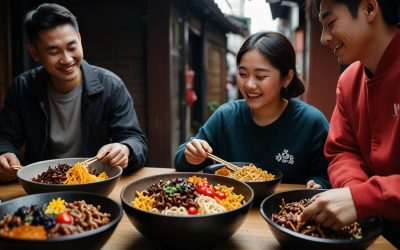Why Jajangmyeon Is the Official Food of Heartbreak The Origins of Black Day in South Korea

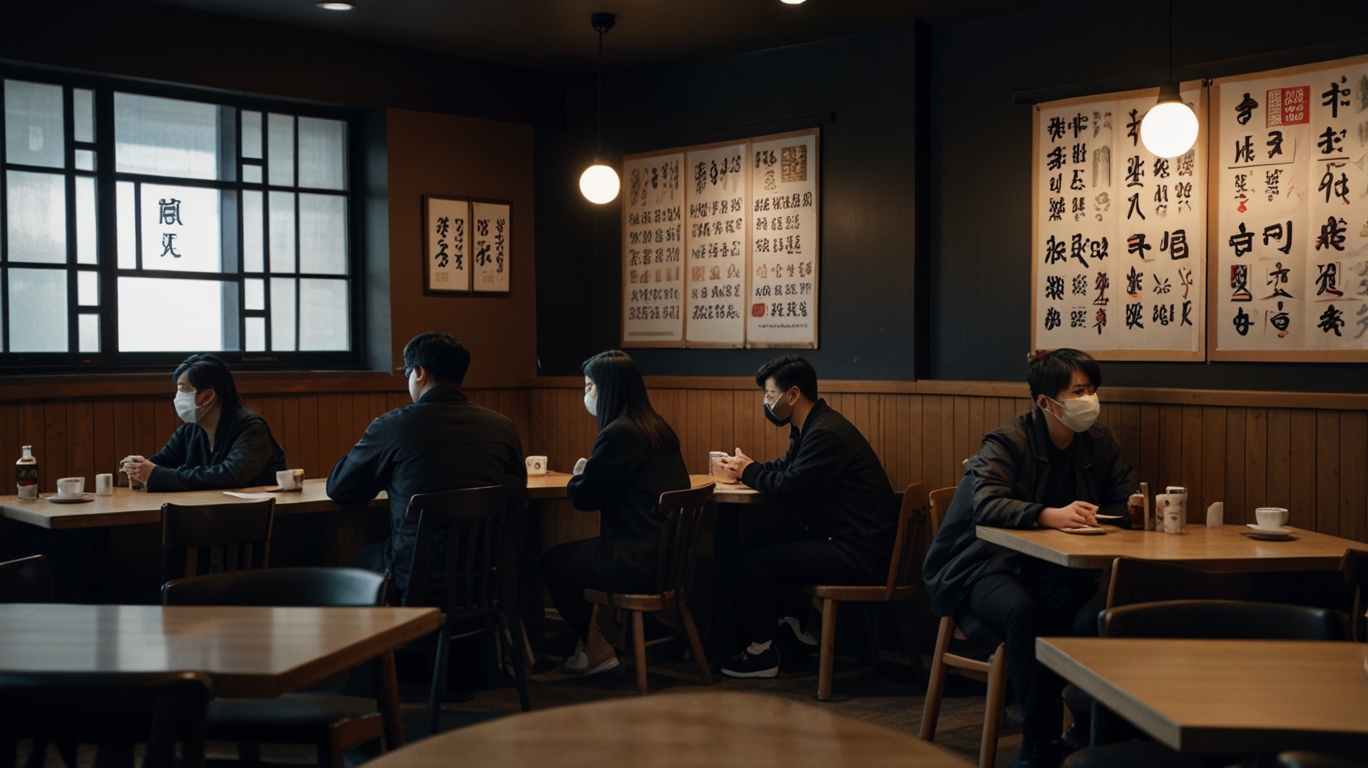
In South Korea, Black Day is a relatively modern tradition that has taken root as part of a unique cultural cycle of love-related celebrations. Every February 14th, Valentine’s Day, women in South Korea customarily give chocolates or gifts to men as tokens of affection. A month later, on March 14th, known as White Day, men return the favor with reciprocal gifts, often in the form of sweets, flowers, or jewelry. While both holidays are heavily commercialized and celebrated with enthusiasm by couples, they inadvertently highlight a painful truth: not everyone has someone to exchange gifts with. Out of this social contrast emerged Black Day on April 14th, a day that specifically acknowledges and gives space to those who remain single or unattached. Instead of being left out of the romantic celebrations, singles created their own counter-holiday, one filled with a mix of humor, irony, and self-awareness. On this day, many people dress in black, not as a sign of mourning in the traditional sense, but as a playful acknowledgment of solitude. However, beneath the lighthearted gestures lies a deeper commentary on the emotional experiences of those who feel excluded from the romantic norms of society. Black Day, therefore, is not just about noodles or gatherings; it is an event that reflects how South Korea embraces both the joyful and melancholic sides of love within its cultural traditions, giving voice to those who might otherwise feel invisible during the love-centric holidays of February and March.
Why Jajangmyeon Became the Symbol of the Day
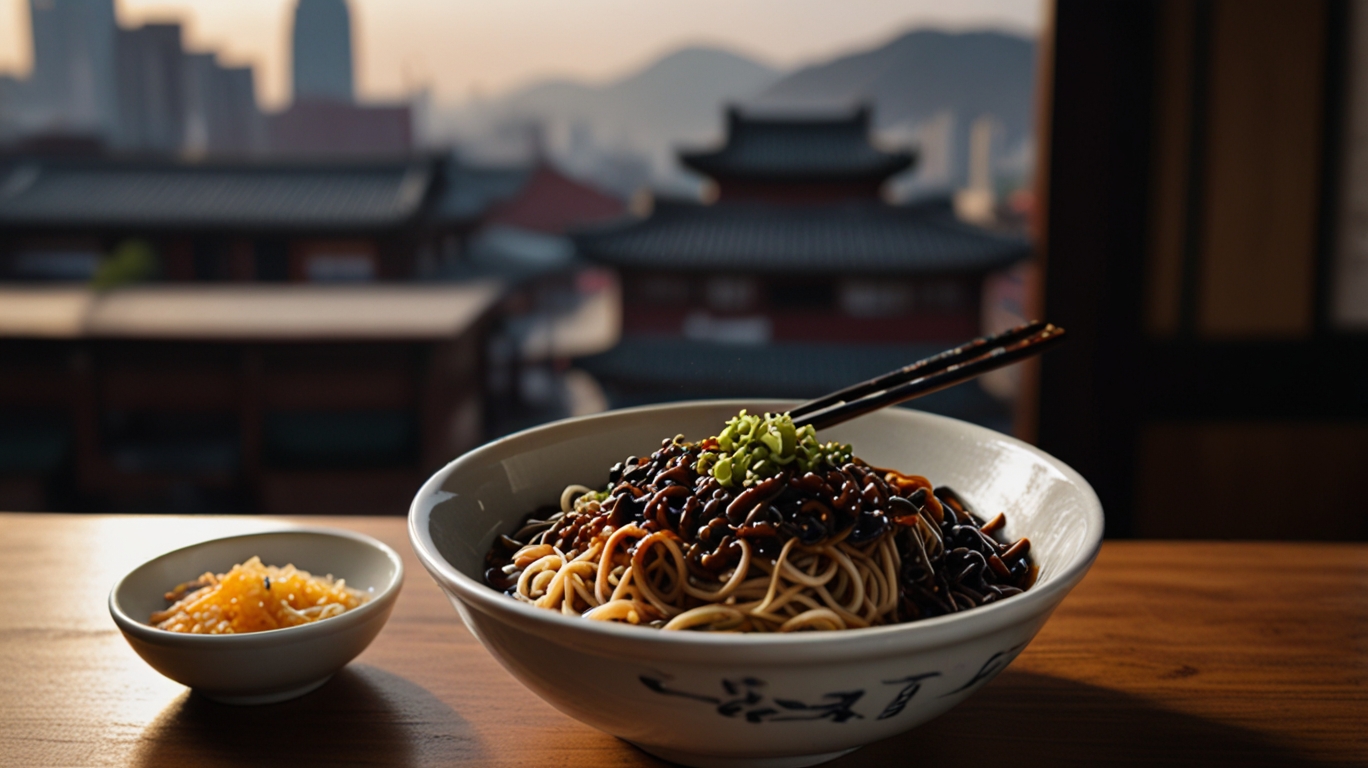
The choice of jajangmyeon, a noodle dish coated in thick black bean sauce, as the official food of Black Day is far from random; it is the perfect culinary representation of the holiday’s themes of solitude, irony, and resilience. First, the dish’s defining feature—its dark, glossy sauce—directly reflects the “black” symbolism of the day. Just as people wear black clothes to align with the theme, the meal itself visually captures the essence of heartbreak and loneliness through its color. Second, jajangmyeon is one of the most widely accessible dishes in Korea. Originating from Korean-Chinese cuisine, it is inexpensive, comforting, and easily ordered through countless delivery services, which makes it an inclusive option for everyone, regardless of social class or financial means. Unlike elaborate meals that couples may enjoy on romantic holidays, jajangmyeon does not demand preparation, planning, or expense; it is a humble dish that anyone can enjoy, alone or with friends. The act of eating it on April 14th becomes a symbolic gesture, almost a rite of passage for those who identify with the holiday. The dish’s universality gives it the power to unite people across age, gender, and background in the shared experience of acknowledging singleness. Over time, jajangmyeon has become so strongly tied to Black Day that it is impossible to separate the two, with restaurants and food chains even marketing the dish specifically for the occasion. What began as a simple, inexpensive noodle meal has transformed into the cultural emblem of solitude and survival in the face of unfulfilled romantic expectations.
Jajangmyeon as Comfort Food in Heartbreak
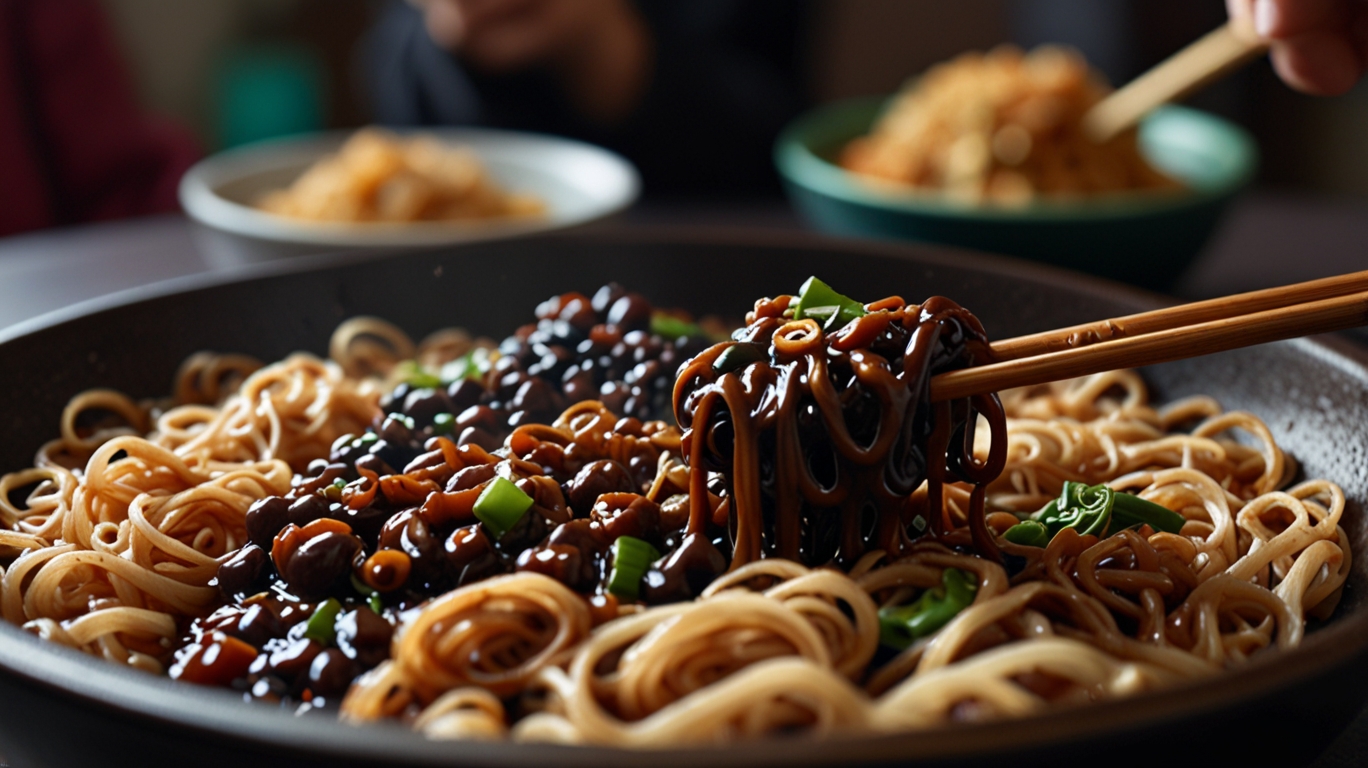
For many, the ritual of eating jajangmyeon on Black Day goes far beyond its visual symbolism; it is deeply tied to the human need for comfort food during emotional lows. Heartbreak, loneliness, and unreciprocated affection are universal experiences, and food often plays a powerful role in helping people process those emotions. Jajangmyeon, with its rich, savory flavors and hearty texture, offers more than just nourishment—it provides emotional relief. Noodles have symbolic value in many Asian traditions, often representing continuity, longevity, and resilience, and in the case of Black Day, this meaning resonates with those enduring heartbreak. The dark, slightly bittersweet black bean sauce further enhances the metaphor, acting as a culinary parallel to the bittersweet nature of love and loss. On a practical level, jajangmyeon is comforting because it is familiar; for many Koreans, it is tied to memories of childhood, school lunches, family gatherings, or casual meals with friends. This sense of familiarity provides stability in moments of vulnerability. When someone sits down to a bowl of jajangmyeon on April 14th, they are not only consuming a dish—they are engaging in an act of self-soothing, embracing a ritual that validates their emotions without judgment. Unlike celebratory foods that demand joy or luxury, jajangmyeon is humble and grounding, making it the ideal dish to accompany the raw, unpolished realities of heartbreak.
The Social Side of Eating Jajangmyeon on Black Day
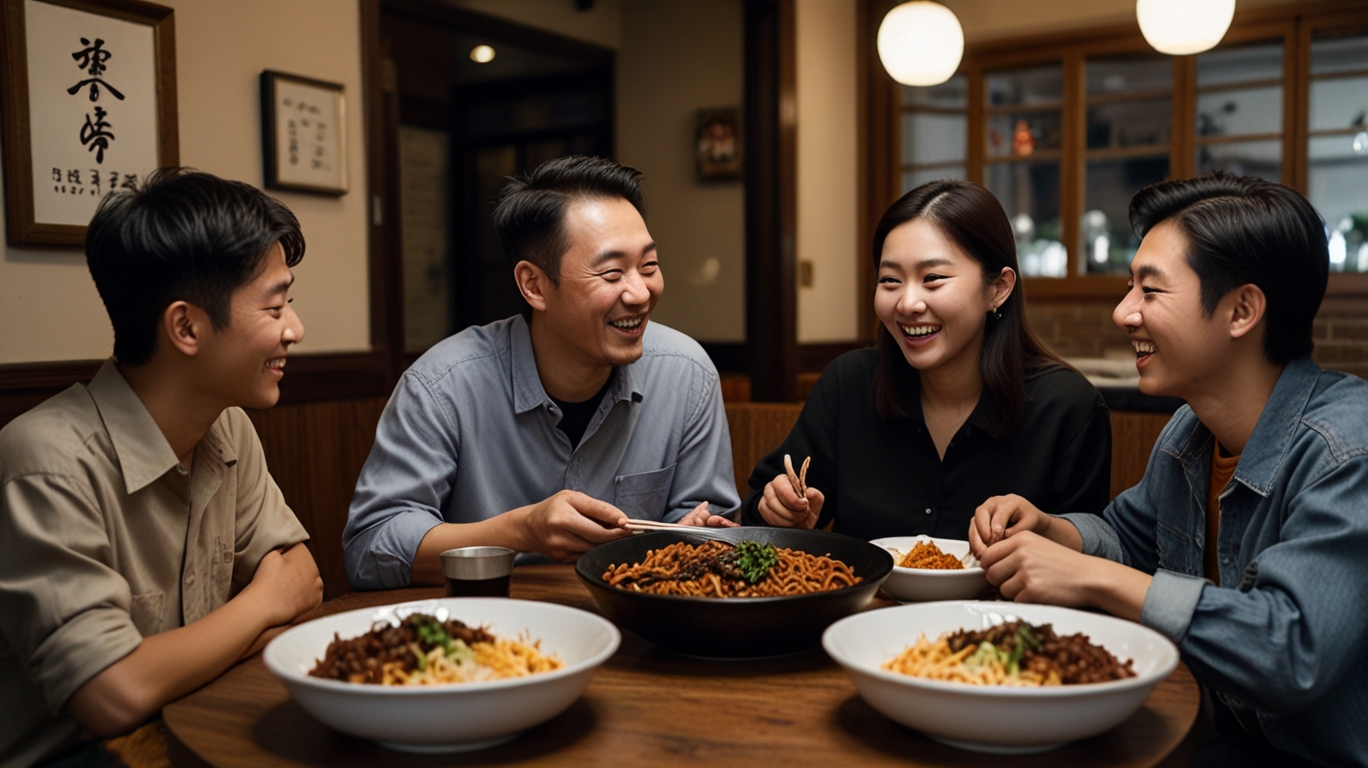
Although Black Day is often associated with the solitude of being single, the actual practice of the holiday frequently emphasizes community and connection rather than isolation. Many people who observe Black Day choose to gather in small groups with friends, co-workers, or even acquaintances who share the same status of singleness, transforming the day into a communal experience. Eating jajangmyeon together becomes a symbolic act of solidarity, where the shared meal represents mutual understanding of heartbreak and loneliness. The restaurant setting, often casual and bustling, allows for laughter, storytelling, and camaraderie, which balance out the more somber undertones of the holiday. Instead of spending the day wallowing in sadness, people often find comfort in realizing that they are not alone—that countless others are navigating the same emotional experiences. In fact, this social aspect redefines the meaning of Black Day itself. It is no longer solely about mourning the absence of love but about celebrating the presence of friendship, community, and empathy. By sharing jajangmyeon, singles collectively reclaim the narrative surrounding singleness, shifting it from a point of pity to one of humor and connection. The day becomes less about what is missing and more about what remains: the human capacity to form bonds outside the boundaries of romance.
Jajangmyeon in Popular Culture

The symbolic power of jajangmyeon and Black Day has been further solidified by its frequent appearances in South Korean popular culture. In television dramas, films, and even variety shows, Black Day scenes often depict characters ordering or eating jajangmyeon, either as a humorous nod to their single status or as an emotional moment of reflection. For viewers, these scenes reinforce the association between heartbreak and jajangmyeon, making the dish a recurring visual metaphor for solitude and resilience. In many dramas, a character’s choice to eat jajangmyeon alone conveys volumes about their emotional state without the need for dialogue, and when characters eat it together, it signals solidarity and shared vulnerability. Beyond media, restaurants and delivery services have leaned into this cultural symbolism by promoting jajangmyeon specifically on April 14, often offering discounts or themed promotions to attract diners. This commercialization has only deepened the tradition, ensuring its continued relevance in modern Korean life. What began as a playful counter-holiday has become a cultural phenomenon recognized across the country and even abroad, with jajangmyeon serving as its most iconic symbol. The dish is now not only tied to Black Day itself but also functions as a broader metaphor in everyday life, representing the universal experience of navigating love, loss, and the bittersweet journey of human emotions.
Beyond Heartbreak: A Celebration of Identity
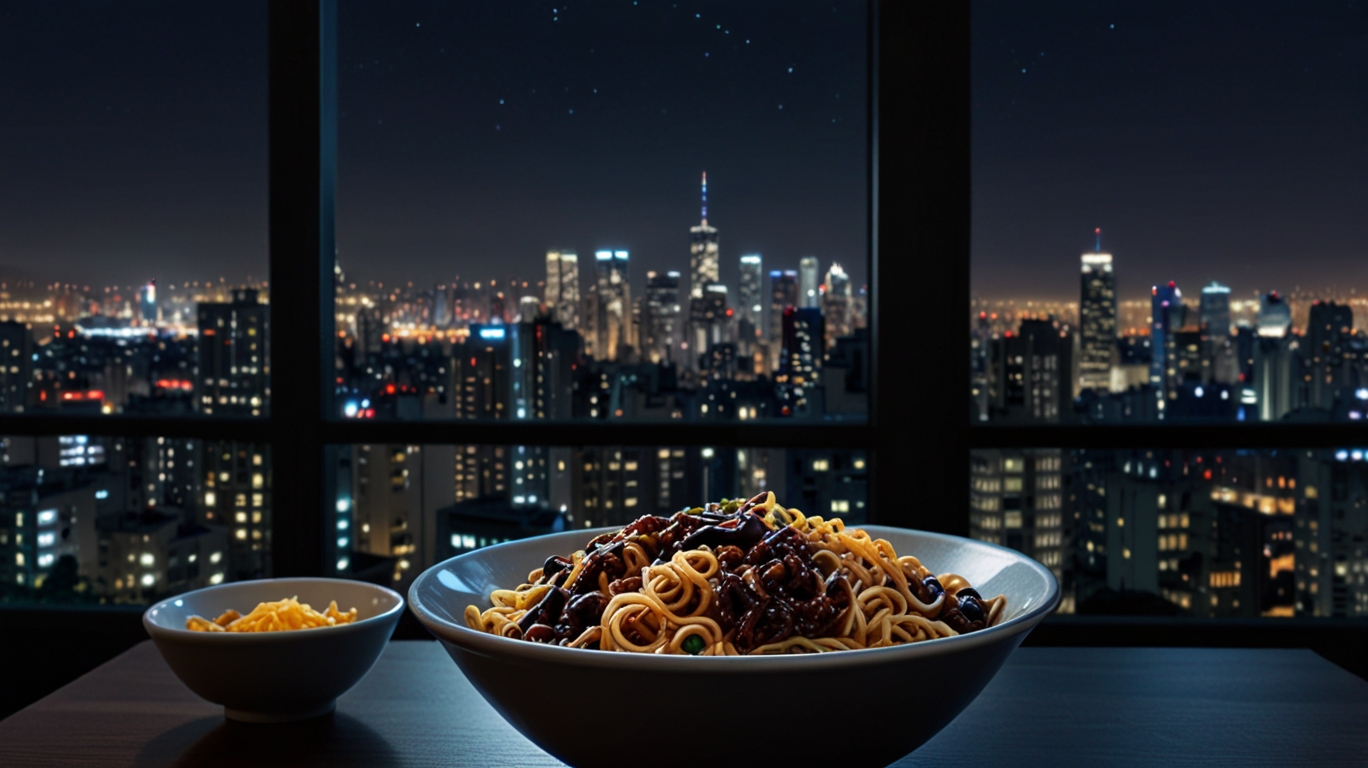
While the name “Black Day” and its rituals might suggest a focus purely on sadness or rejection, the holiday has increasingly been reinterpreted as a celebration of individuality and self-acceptance. Eating jajangmyeon on this day does not have to be a symbol of defeat or loneliness; instead, it can be viewed as an act of reclaiming one’s narrative. In a society that often places strong emphasis on dating and marriage, being single can sometimes feel like a stigma, but Black Day offers a counterbalance by normalizing and even celebrating this stage of life. Sitting down with a bowl of jajangmyeon becomes a declaration of self-identity, where one acknowledges their current place without shame or apology. For some, it is an opportunity to reflect on personal growth, independence, and the freedom that comes with being unattached. For others, it is simply a humorous acknowledgment of reality, taken in stride with laughter and community. By reframing the dish and the day as symbols of empowerment, Black Day challenges the conventional narrative that happiness is only found in romantic relationships. Instead, it asserts that self-love, friendship, and personal fulfillment are equally worthy of recognition. In this way, jajangmyeon transcends its status as comfort food for heartbreak and becomes a powerful emblem of resilience, independence, and the beauty of embracing one’s own journey.
RELATED POSTS
Single and Proud: How Koreans Celebrate Black Day
Black Day in South Korea is one of the most intriguing cultural celebrations in the world. Unlike Valentine’s Day or White Day, which focus on couples exchanging gifts and romantic gestures, Black Day is reserved for singles. Observed every year on April 14th, this...
